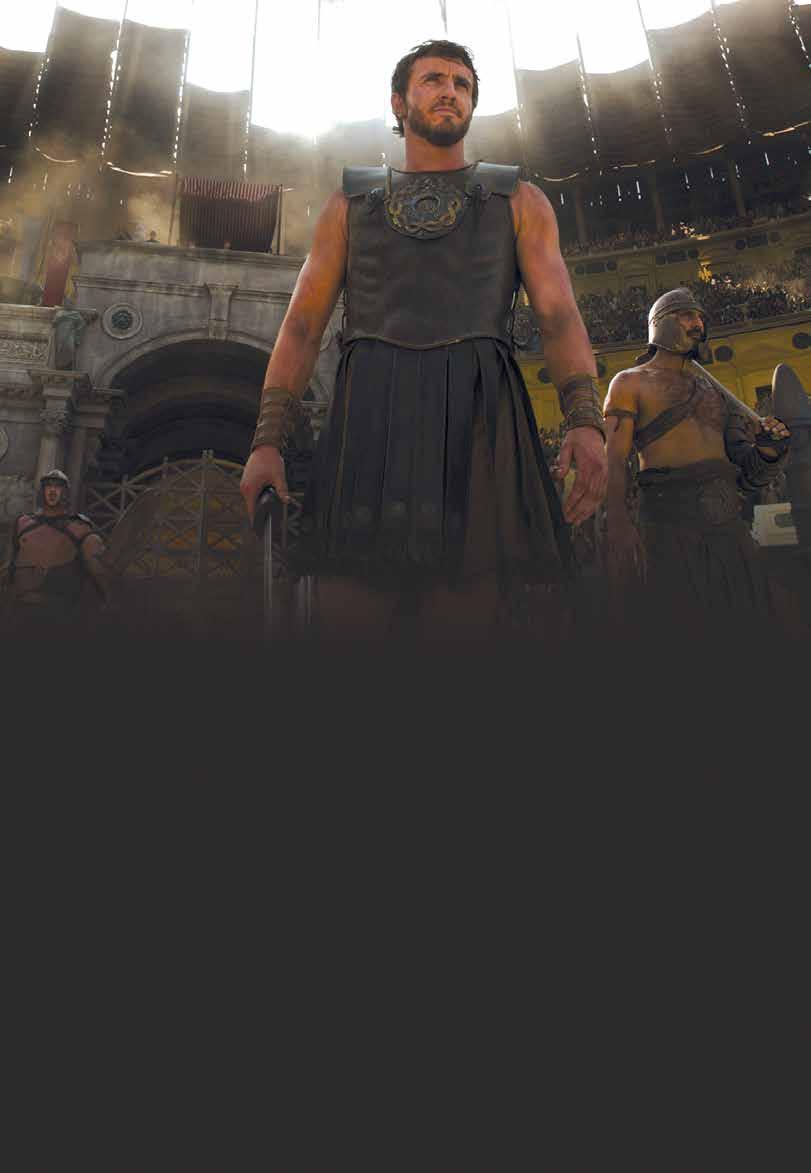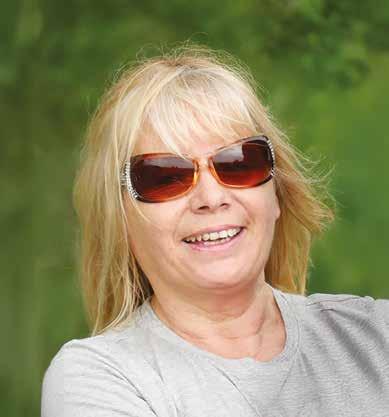A-ma-zing
JB Gill on his time in Strictly
Gladiator ready for return of film franchise




JB Gill on his time in Strictly
Gladiator ready for return of film franchise



The Salvation Army is a Christian church and registered charity seeking to share the good news of Jesus and nurture committed followers of him. We also serve people without discrimination, care for creation and seek justice and reconciliation. We offer practical support and services in more than 700 centres throughout the UK. Go to salvationarmy.org.uk/find-a-church to find your nearest centre.
The Salvation Army first published a newspaper called the War Cry in London in December 1879, and we have continued to appear every week since then. Our name refers to our battle for people’s hearts and souls as we promote the positive impact of the Christian faith and The Salvation Army’s fight for greater social justice.
For millions of people, Saturday evenings at this time of year consist of music, costumes and dancing – while they themselves are sitting on their sofas at home. Strictly Come Dancing has become the go-to programme for sequined outfits, toe-tapping music, stunning light shows and – when the celebrities get their footwork right – great dance routines.
It is easy, feelgood TV for its fans. However, for those celebrities taking part in the show, it is anything but easy.
‘The cha-cha is the hardest thing I’ve ever done in my life,’ contestant JB Gill tells us in an interview about his time on the show. This weekend the singer and TV presenter is looking forward to performing at the Blackpool Tower ballroom, which he hopes will be another highlight for him.
‘I’ve absolutely loved every part of being involved in the show,’ he says. But it’s not just the glitz and glamour of appearing on one of the UK’s most watched programmes that makes the experience special for him.
Editor: Andrew Stone, Major
Deputy Editor: Philip Halcrow
Assistant Editor: Sarah Olowofoyeku
Staff Writer: Emily Bright
Staff Writer: Claire Brine
Editorial Assistant: Linda McTurk
Graphic Designer: Mark Knight
Graphic Designer: Natalie Adkins
Email: warcry@salvationarmy.org.uk
The Salvation Army
United Kingdom and Ireland Territory
1 Champion Park London SE5 8FJ
Tel: 0845 634 0101
Subscriptions: 01933 445445 (option 1, option 1) or email: subscriptions@satcol.org
Founders: William and Catherine Booth
International leaders:
General Lyndon Buckingham and Commissioner Bronwyn Buckingham
Territorial leaders: Commissioners Jenine and Paul Main
Editor-in-Chief: Major Julian Watchorn
ISSN 0043-0226
The Salvation Army Trust is a registered charity. The charity number in England, Wales and Northern Ireland is 214779, in Scotland SC009359 and in the Republic of Ireland CHY6399.
Printed by CKN Print, Northampton, on sustainably sourced paper


‘I am using my physical gifts of dance, musicality and timing – gifts which I believe were given to me before I was born,’ he explains. ‘Whenever you use your God-given gifts, it brings glory to God and is an expressing of faith.’
Christians believe that God gives everyone special gifts, talents and abilities. However, that does not mean that everyone will be able to twirl their way through a Viennese waltz (as celebrity dancers have proved in past series of Strictly). That’s because the gifts that God gives are unique to each individual.
The great news is that, if we allow God to show us the gifts he has given to us and how we can best use them, we’ll then be in step with him and be able to enjoy the very best life possible.
When you’ve read the War Cry, why not pass it on ➔





By Philip Halcrow
Back at the turn of the millennium, a film about ancient Rome came into cinemas; millions saw it; and it conquered at the Oscars. Now, XXIV years after Gladiator, a sequel is picking up the story.
In Gladiator II, Rome in AD200 is being run by tyrannical twin emperors Caracalla (Fred Hechinger) and Geta (Joseph Quinn), who aim to spread the empire further whatever the cost. The army’s latest conquest is Numidia, where they kill many and capture others – including one mysterious barbarian. Carried back to the heart of the empire, Lucius (Paul Mescal) is thrown into the arena. But he seems able to defeat allcomers, whether man or beast.
Lucius is not keen on Rome. ‘They leave destruction and call it peace,’ he says.
But certain key figures in Rome seem to have a keen interest in him, among them the daughter of the late emperor Marcus Aurelius, Lucilla (Connie Nielsen).
And, while spectacles take place in the Colosseum, Lucilla, her husband General Acacius (Pedro Pascal) and gladiator owner Macrinus (Denzel Washington) are involved in struggles of a political kind.
Screenwriter David Scarpa notes that – though not based on a true story –Gladiator II reflects some elements of Rome’s history, including characters such as Lucilla and the twin emperors.

Paul Mescal thinks that what went on in the Colosseum may seem far-fetched to modern audiences. Even prizefighting and MMA ‘pale in comparison to what these men and women endured’, he says.
On the other hand, director Ridley Scott says: ‘This film is about the Roman Empire, obviously. But it’s also about the way humanity never learns its lesson.’ And Derek Jacobi – who plays senator Gracchus – says the film ‘touches on so many points of human existence’.
Certainly there are familiar human traits on show. Macrinus, like the emperors, wants power, whatever it means for others. Lucius and Lucilla separately talk of freedom for themselves and for the people, while Gracchus laments that ‘the people have not seen hope for many years’.
Societies have often struggled to do the right thing. They can even become hellish. Humanity is capable of going wrong time and again – and so is every human.
It was a truth acknowledged by one ancient scribe in a letter, written circa AD57, and sent to a gathering in Rome.
In the letter, the early Christian Paul confesses how he has been aware of his own inner struggle between right and wrong. But he insists that everyone can find freedom from the hellishness of their own self-centredness, sense of superiority and prejudice.

Through Jesus, he writes, God revealed the extent of his love for humankind –which is a love that, if accepted, ultimately cannot be kept down by any kind of troubles.
‘In all these things,’ Paul says, ‘we are more than conquerors through him who loved us. For I am convinced that neither death, nor life … nor powers … nor anything else in all creation, will be able to separate us from the love of God in Christ Jesus’ (Romans 8:37–39 New Revised Standard Version).
The words have echoed through history. And the countless people who have lived by them have found forgiveness for their failings, hope in the face of the wrongs of others – and a love that goes on ad infinitum.
Claire Brine gives her take on a story that has caught the attention of War Cry reporters
The Princess of Wales ‘may be increasingly open to exploring a more spiritual side of life’, according to an article in The Times
The paper reported that in his updated biography Charles III: New King, New Court, The Inside Story, Robert Hardman touches on the faith of the Prince and Princess of Wales and their attitudes towards churchgoing.
After noting that Prince William is ‘rarely seen at church’ outside of Christmas, Easter and royal calendar events, the article quoted Hardman’s words: ‘The princess, on the other hand, is said to have become rather more interested in questions of faith as a result of her condition.’
My prayers become much more heartfelt
After undergoing cancer treatment earlier this year, Princess Catherine released a video in which she said: ‘For everyone facing this disease, in whatever form, please do not lose faith or hope. You are not alone.’
Picking up on her use of the word ‘faith’, the article said it was understood that ‘the princess has found common ground with the King in believing in a holistic, spiritual element to their concurrent recoveries from cancer’.
In joining the many people who choose to speculate on the faith of the royal family, I wouldn’t be surprised to learn that – in the face of cancer – Kate has found herself pondering her religious beliefs. In painful, frightening and uncertain times, it’s natural to consider the big questions of life and seek some answers. And I imagine that one of the biggest questions to crop up throughout history has been: Is God real?
Though everyone will answer such a question differently, my own experience is that God’s presence has seemed most tangible to me when my life has felt at its most fragile. Perhaps that’s because my prayers become much more heartfelt (and much less filtered) when there’s no knowing what tomorrow brings. And the more honest my prayers, the more open my heart becomes to sensing God’s presence and feeling his peace.
Wherever we see ourselves in terms of our spiritual journey, I believe that God welcomes anyone who takes the steps to seek him. Whether we are calling out to him for the first or fiftieth time, he always cares, always listens – and is always there.


A dyslexia-friendly children’s Bible has been published.
Created by US publishers Lifeway, the CSB Grace Bible for Kids is aimed at children aged 7 to 12 and uses a typeface and layout developed by graphic design company 2K/ Denmark and Cambridge University.
The design adds space between letters, words, lines and paragraphs. It also provides distinct letter forms to make the text more readable, and helps readers differentiate between pairs of similar letters, such as m and n or p and q. Specially coloured page overlays aim to enhance visual processing and reduce visual stress.
Lifeway’s president, Ben Mandrell, explained: ‘Dyslexia shouldn’t keep kids from reading the Bible. At its core, the CSB Grace Bible for Kids is helping young readers interact and connect with God in a personal way through his word.’
An equivalent Bible for teens and adults will be available in February 2025.
The Prince of Wales highlighted The Salvation Army’s Housing First project when he fronted a two-part ITV documentary exploring solutions to homelessness.
In Prince William: We Can End Homelessness, the prince, who is an ambassador for Homewards, a homelessness charity collaboration project, met Wayne Spencer at Windsor Castle. Wayne is one of 24 former rough sleepers who have been provided with a home by the Housing First scheme in Cardiff. Housing First programme manager Jemma Jones was also on hand to explain more about the scheme, which offers intensive support to long-term rough sleepers who have complex needs and moves them into their own accommodation.
Wayne had been homeless on and off since the age of 15, and struggled with drugs, alcohol and his mental health. But, as he told William, an encounter with Jemma and the Housing First programme changed his life. Wayne now no longer takes drugs, has reduced his alcohol intake and is back in contact with his daughters.

A barista programme run by The Salvation Army in Carmarthen is celebrating the success of its first graduates.
The course is a foundation-level qualification which covers making coffee, hygiene and customer service. It also provides a certificate in food safety.
Chris Jones, who has severe epilepsy and learning difficulties, recently qualified from the six-week course. He now works one day a week at The Salvation Army’s Imagine coffee shop alongside his carer, Karen Davies.
Chris said: ‘I love this role. I’m enjoying meeting new people and making them happy by serving them what they enjoy. I’m trying to use the experience I’ve had here at the Salvation Army café to get a job elsewhere.’
The Salvation Army is now helping Chris to find a role in a high street coffee shop.

Chris Jones
nOne of the founders of The Salvation Army is among 100 Christian heroes to be commemorated at a major landmark.
William Booth, who, with his wife Catherine, founded The Salvation Army in 1865, will be remembered on the site of the Eternal Wall of Answered Prayer when the monument near Birmingham is completed. More than 100 trees will be planted and named after notable Christian figures of the past, including evangelist Billy Graham and Baptist preacher Charles Spurgeon.
The Eternal Wall will be made up of one million bricks, all representing answered prayers. Visitors will be able to scan any brick on a smartphone via a QR code and read about an answered prayer.
A report on Christians oppressed for their faith found that human rights violations against them have increased in 60 per cent of countries surveyed since its last edition.
Persecuted and Forgotten, released by the organisation Aid to the Church in Need (ACN), examined the challenges facing Christians in 18 countries.
It said that the number of incidents of persecution against Christians in India went up from 599 to 720, and cases of believers detained in Iran rose from 59 in 2021 to 166 in 2023. In Eritrea, some 400 Christians are imprisoned without trial because of their faith.
ACN is asking people to sign an open letter, calling on the UK government to make persecuted Christians and other religious minorities a priority for taxpayer-funded UK aid.
In between rehearsals and routines, JB GILL answers some questions about his experiences on TV’s Strictly Come Dancing
Interview
by Sarah Olowofoyeku
With a foxtrot, a jive and a cha-cha under his belt, JB Gill has spun his way to success and made the top seven couples in this year’s series of BBC1’s Strictly Come Dancing – but it hasn’t come without challenges.
The pop star-turned-presenter has been putting his best foot forward, but found himself in the bottom two a few weeks ago. And his professional partner Amy Dowden had to leave the show because of a foot injury, meaning that JB had to get used to dancing with a new partner, Lauren Oakley.
After Amy shared a post on Instagram, expressing her disappointment at having to leave, JB reposted it to his story, saying that he was heartbroken for her but assuring her that ‘like a phoenix you will rise’. He also referenced Isaiah 40:31 in the Bible, which says that people who
hope in the Lord will soar like eagles. Despite the difficulties, hitting the Strictly dancefloor has been a positive experience for JB.
Q: JB, what made you take part in Strictly Come Dancing this year?
A: It’s the first year that I’ve actually been able to do the show. It’s something I said I’d be open to doing, but this year I feel like the stars aligned to make it happen. Even though I was on tour with JLS, not one date clashed, so I guess it was meant to be!
Q: What have you enjoyed most about being on Strictly?
A: I’ve absolutely loved every part of being involved in the show. Meeting the other celebrities, working with my pro partners, the costume team are so
unbelievable with what they do and how they make everything work, the creative team genuinely want the best for everyone and their routines, so it really does feel like a massive family.
Q: What have you found challenging?
A: The cha-cha is the hardest thing I’ve ever done in my life. The steps are weird and it’s the most unnatural position on the body. The feet have to be turned out, the body isn’t allowed to bounce. There are so many rules and principles to the technique, it’s hard to get your head around it.
Q: Has your experience of performing with JLS helped you?
A: Not really! Amy came to my last tour date for JLS and in my first week in rehearsals, and she said to forget everything I’ve ever done with JLS. Even if I’d remembered all of that, it doesn’t come close to helping you do an American smooth.
JB dancing the

Q: In an interview with Premier Christianity magazine a few years ago, you said: ‘For a lot of people, God is reserved for a day, or for a time, or for a special occasion. But, actually, our faith should be with us all the time.’ How is your faith with you when you perform on Strictly?
A: I am using my physical gifts of dance, musicality and timing – gifts which I believe were given to me before I was born – in order to express myself on the dancefloor every week. Whenever you use your Godgiven gifts, it brings glory to God and is an expressing of faith.
Q: What was your introduction to Christianity and how has it played a role in your life since?
A: I was brought up in church. My greataunt would take me to Sunday school

and was a role model for me all through my youth. As an adult, I reconnected with my faith before I got married to my wife, Chloe. We were about to embark on an amazing journey as husband and wife, starting a family, setting up life together and having our faith at the centre of that. Those Christian principles are incredibly important to our family.
Q: Christmas is coming up – and, with it, the Strictly final, where hopefully you’ll be celebrating winning the glitterball trophy. But you and Christians everywhere will also be celebrating Jesus’ birth. What does the story of Christmas mean to you, in terms of your faith, and how will you be celebrating this year?
A: It’s a time of incredible joy. Not only is it a story of how, against all odds, God sent his Son to Earth for all of us, but it’s a time for us to get together as a family and also to see out an old year and celebrate a new one.
Q: What are you looking forward to as Strictly continues? And what will you take away from the experience?
A: I’m looking forward to the challenge of every dance style. I think the speed of learning is greatly underestimated – the pros have taken years to master things that we are aiming to learn and recreate in a matter of days, so anything I learn will be going in my dance piggy bank so that I can bring it out and recreate it whenever I get a chance!

ANGELA THOMSON tells how the death of her husband by suicide drained the colour from her life – and how faith and helping others brought it back
Interview by Sarah Olowofoyeku

Angela Thomson
‘It was a day that changed the rest of my life,’ says Angela Thomson as she recalls Hogmanay 2003. Speaking to me on a video call from her home in Edinburgh, she says: ‘It’s a big day of celebration in Scotland. My husband’s birthday was a few days away, and I had gone to get him something for it. When I came back, he had taken his own life.’
Angela has been willing to talk about her story with other people, hoping that it will help those who have been through similar experiences. She recalls how the day of her husband’s death was for her the beginning of a ‘journey through pain’ and describes how her husband, Ben, had been carrying a pain for some time.
‘His was a hidden pain in many ways, because he was a very gregarious man, a solid Christian,’ she says. ‘He had a great sense of humour, so he was always joking, and singing in the shower. He had a very high-powered job in finance, and he was a bit burnt out.
‘He had been diagnosed with depression, and the antidepressants made him suicidal. He knew that, and we spoke about it. He went to the doctor, and she doubled his dose. In my view, that’s what pushed him over the edge. I think the medication compounded so much of what he was feeling, and he just couldn’t cope any further.’
With three sons – two teenagers and a 20-year-old –Angela wondered how she would cope.
She says: ‘One question I asked was, “How can I be

a mother and father to my sons?” I asked the question to God, and he told me I didn’t have to be. He said he’d only asked me to be a mother, and he would be their Father. And what a consolation that was to think that God was looking after them! But my whole life was turned upside down.
‘I saw the whole canvas of my life as black. I didn’t have any love for life. I wanted to keep going for the sake of my kids, but I’d lost interest in everything.’
The initial period after her husband’s death was about Angela says, ‘survival’. Suicide was more of a taboo subject at the time, and so she was not only unsupported, but she felt judged too. People would cross the street when they saw her or would ask how her husband could do what he had done. But she felt God’s help during the difficult days.
‘God said to me: “I’m going to put amazing colour on the canvas of your life.”
The picture he showed me was like when a child does a beautiful, coloured picture, then they colour over it with a black crayon, then they get a tool and scrape it and the colour is revealed. I had to hold on to that image to help me survive.
‘One day I was sitting in the house and feeling really down, when I heard a tap at the door. I lived in a housing estate, and yet there was a male pheasant tapping at my door, with the most beautiful colours possible. And I felt God say: “Look, I’m bringing colour. Expect it.”
‘The truth is that I didn’t have any expectation, but God kept speaking hope into my life.’
Afew years after her husband’s death, Angela felt she could help others with experiences of pain and suffering by working with the local church and later by becoming a pastor, which was part of her own healing journey.
But it wasn’t until the age of 64, when she began to study for a master’s degree on suicide bereavement, that she went into the depths of what had happened to her. Part of her path to healing was interviewing other people who had been bereaved by suicide. Interviewing also
gave her the opportunity to help others. She now works with the Canmore Trust, which trains people in similar situations by suicide to support others who have been bereaved and encourage them to find purpose in life.
‘God comforts us, so that we can get alongside others with that comfort,’ she says. ‘I feel that the call on my life is to go into that dark place of suicide bereavement with other people.
‘Suicide is still a hidden topic, but I felt that God told me not to hide it, but to speak about it.’
Angela’s message is one that gives hope and comfort.
‘God is a God of love,’ she says. ‘He understands our mental health issues. When I asked God the question of where he was when my husband died, he said: “I was standing with my arms wide open to receive him.”
‘In the darkest of circumstances, in our most isolated place, God is there with us, and he brings us that glimmer of hope when we have none.’

Usha Reifsnider
When Usha Reifsnider was growing up as a British Gujurati in the West Midlands, the only positive image she saw of people on TV who looked like her was in a CocaCola advert. Another image that had a lasting effect on her was of Indians and other people of colour standing up and teaching as missionaries in a church presentation.
When she said that she too wanted to be a missionary, Usha was told she could go to India.
‘I thought to myself: if I was white, they would’ve said I could go anywhere,’ she remembers.
Academic
and missionary USHA REIFSNIDER felt marginalised and unheard for
years. But when she discovered a theory that explained her experience, she wanted to use it to help others whose voices had been put on mute. She describes the theory and tells how God’s design is for diversity
Interview by Sarah Olowofoyeku
Usha did grow up to become a missionary, teaching people in many countries about God. But, since becoming a Christian at the age of 11, she had experienced a sense of exclusion when around other Christians.
It wasn’t until she was undertaking research for her doctorate in 2014 that she came across the muted group theory, developed by anthropologist Shirley Ardener, and found that it resonated with her own experience.
‘Muted group theory was being used to talk about how women were treated in a workforce,’ she explains. ‘For example, the women would be on the factory floor
but the men were in the boardroom, and they made the decisions. The factory floor people and the boardroom people didn’t use the same language.
For a woman to be promoted to the boardroom, she had to act like a man, talk like a man and put up with their jokes, and she didn’t quite belong. But they needed her there to prove they weren’t sexist.
‘And for her to be there, she had to reject the factory floor women, who felt betrayed. She became afraid to let any of the other women into the boardroom, because then was she going to lose power or be kicked out? Surely there was

only room for one woman.
‘When I looked at that I thought: this was how I felt as a Christian from an Indian background.’
Usha doesn’t believe such exclusion is God’s design for the Church, so she edited a book called Unmuted, bringing muted group theory to the Christian context. It is made up of chapters, written by Christians from a range of backgrounds and lived experiences, which explore the unmuting of groups including migrants and the Roma community. There are also chapters on disability theology and on African theology in connection with the climate.
The book and its amplification of certain muted voices reflect Usha’s belief in the importance of interdependence in the Church.
‘Sometimes I ask God why I don’t have a head like an owl, who can see 360 degrees,’ she says. ‘It’s because God wants us to have each other’s back. I can
see behind you something that you can’t, and you can see behind me something that I can’t. There’s an interdependency.’
Usha is also keen to emphasise that the theory is not simply a case of ‘the muted’ and ‘the muters’. She is aware that it is possible to be both a victim and a perpetrator of marginalisation.
‘I’m also complicit in the muting of others,’ she admits. ‘Each of us is surrounded by people we mute.
I can’t change the past, I may still get things wrong
‘A
nd as a follower of Jesus, I would say to people I have muted: I am sorry. I am sorry if I’ve seen things and haven’t spoken out, I’m sorry that you felt left out. If you would honour me with the privilege of hearing your story, perhaps
that would help. I can’t fix it, I can’t change the past, I may still get things wrong, but I’m here now and if you want to talk to me about this, I will hear you.’
Though Christians, being human, may continue to make mistakes, Usha’s book and her wider work in missions – sharing the gospel with people around the world – are fuelled by the hope that she has in Jesus and his offer of God’s forgiveness.
‘For every one person I can call out on muting me, there are thousands that could call me out,’ she says. ‘Which is why God and his unfathomable gift of grace are so important to me.’

l Unmuted is published by Apollos
The War Cry invites readers to send in requests for prayer, including the first names of individuals and details of their circumstances, for publication. Send your Prayerlink requests to warcry@salvationarmy.org.uk or to War Cry, 1 Champion Park, London SE5 8FJ. Mark your correspondence ‘Confidential’.
jBecoming a Christian
There is no set formula to becoming a Christian, but many people have found saying this prayer to be a helpful first step to a relationship with God
Lord Jesus Christ,
I am truly sorry for the things I have done wrong in my life. Please forgive me. I now turn from everything that I know is wrong.
Thank you that you died on the cross for me so that I could be forgiven and set free.
Thank you that you offer me forgiveness and the gift of your Holy Spirit. Please come into my life by your Holy Spirit to be with me for ever.
Thank you, Lord Jesus. Amen

Eating fruit and vegetables is good for us – and, according to the Bible, a healthy inner life also includes fruit. In this series Peter Mylechreest takes his pick of nine life-enhancing qualities called ‘the fruit of the Spirit’
Catherine was a Christian poet of gentle sensitivity. She could describe the peaceful shores of Galilee and write of seeing God in the face of a boy down a Devon lane. Her physical fragility disguised a powerful inner strength. Some, from a distance, would call her meek. Those who knew her well understood that she may have been meek but she was not weak.
Catherine had a strong conviction that Christians were duty bound to take a pacifist stand. While other Christians held opposing views, Catherine did not brush them aside with sweeping assertions or thoughtless words. This gentle woman expressed what she believed in, but guarded her tone so that it was well received, even if sometimes it was painful both to her and her listeners.
Paul, an early Christian teacher, labelled gentleness as ‘the fruit of the Spirit’. Gentleness is a strong hand with a touch that displays tenderness and compassion. It is the result of God’s Spirit being active in a Christian in a way that makes them sensitive to other people’s needs, even when no words are spoken.
It is regrettable that some people think ‘gentleness’ means ‘not saying boo to a goose’ or becoming the proverbial doormat. They are mistaken. Gentleness is strength under control. As one old saying goes: ‘Nothing is as strong as gentleness, nothing is so gentle as real strength.’
Occasionally gentleness has been associated with the kind of ‘ever so humble’ attitude represented by the insincere Uriah Heep in Dickens’s novel David Copperfield

It is also sad that in the past the term ‘gentleman’ was a position in society. Some who were addressed as gentlemen were not gentle in their dealings with others, but were harsh and heartless.
However, if we look at Jesus, the man perfectly filled with the Spirit, we see within his personality ruggedness combined with tenderness, strength with gentleness, and confidence with humility.
Today, regardless of rank or position in society, Christians, working in co-operation with the indwelling Spirit of God, will produce gentleness – making a difference in their own lives and the lives of those around them.
Gentleness is good to grow.

To receive basic reading about Christianity and information about The Salvation Army, complete this coupon and send it to
Or email your name and postal address to


1 2 3 4 5 6
Who stars as mum Joy Delaney in the TV drama series Apples Never Fall ?
What does the French word ‘Bienvenue’ mean in English?
Who played Rick Blaine in the classic 1942 film Casablanca?
Arial, Verdana and Calibri are names of what?
Who had a No 1 hit this year with her album Cowboy Carter?
Who is the author of the Sunday Times bestseller Intermezzo?

TV preview: I’m a Celebrity… Get Me Out of Here! every evening ITV1 and ITVX
By Emily Bright
Jetting off to Australia for three weeks sounds appealing. But, for the new cast of I’m a Celebrity… Get Me Out of Here!, which starts its 24th series on Sunday (17 November), there’s a catch.
Under the watchful eyes of presenters Ant and Dec, the celebrities are expected to live in an Australian jungle and take part in ‘bushtucker trials’. The challenges may mean they must face their fears of heights, enclosed spaces, creepy crawlies and reptiles. Or they may be tasked with ingesting insects and unappetising animal organs – all in the name of family entertainment.
Contestants participate in the trials to win stars, each of which equate to a luxury meal or item for one person. If any challenge proves too much, they can declare, ‘I’m a celebrity, get me out of here!’ and opt out of completing it. But that may come at the cost of stars – and the goodwill of their camp mates and millions of viewers, who can vote for who stays in the contest.
The celebrities also have to rub along with other strong personalities while living in basic conditions they’re simply not used to. As tempers fray and exhaustion sets in, there’s nowhere to hide in the fight to be crowned king or queen of the jungle.
Throughout the show’s history, contestants have developed close friendships, made enemies, laughed, suffered and cried together, creating memorable TV moments. It shows that, while there’s plenty of fun to be had, the show can also be an overwhelming experience for the celebrities.
Although we may never face bushtucker trials, many of us can relate to being overwhelmed by challenges in our lives. Sometimes it can be difficult to see a way through. But there is someone who can support us in whatever we face.
Jesus, God’s Son, once reassured his followers: ‘Here on Earth you will have many trials and sorrows. But take heart, because I have overcome the world’ (John 16:33 New Living Translation).
His words remain true today. If we turn to Jesus, he can help us get through and out the other side of any challenge.
1. Inundate (5)
Tarnish (5)
(3)
Not asleep (5)
Truism (5)
Notions (5)
Component (7)
Robust (6)
Hasty writing (6)
Technical expertise (4-3) 26. Intended (5)
Forty winks (3)
Trample (5)
Likeness (5) 31. Nothing (3)
Amid (5)
Portal (5)
2. Conscious (5)
Satisfied (7)
Lashed out (6)
Proverb (5)
Artless (5)
Confess (5)
Assumed name (5)

Spoil (3)

15. Fresh (3)
17. Weight unit (3)
18. Argument (3)
20. Put together (7)
21. Supple (5)
22. Canopy (6)
23. Pool (5)
24. Greek letter (5)
25. Spa (5)
27. Adjust (5)





INGREDIENTS
15g low-fat spread
1 small onion, finely chopped
250g potatoes, scrubbed and chopped into small chunks
600ml reduced-salt vegetable stock
100g sweetcorn
300ml semiskimmed milk
100g cooked chicken, chopped
2tbsp cornflour
2tbsp cold water
2tbsp fresh parsley, chopped
Ground black pepper

Melt the spread in a large pan and cook the onion for 2-3 minutes, until starting to soften.




Add the potatoes and stock. Bring to the boil, then reduce the heat. Simmer, partcovered, for about 20 minutes, or until the potatoes are tender.
Add the sweetcorn, milk and chicken. Cook for 3-4 minutes, stirring often.
Mix the cornflour with the water in a small bowl until thickened, then add to the pan.
Stir until the soup thickens. Add the parsley and cook for another few minutes.
Season with a pinch of pepper, to serve.
INGREDIENTS
300ml semiskimmed milk
1 pack cup or button mushrooms, washed and sliced
4 slices wholemeal bread
4tsp low-fat spread
4tbsp cornflour
2tbsp cold water

METHOD
Pour the milk into a saucepan and add the mushrooms. Bring to the boil, then reduce the heat and simmer gently for 5 minutes.
Meanwhile, toast the bread. Spread each slice with the low-fat spread.
Mix the cornflour with the water, then stir into the mushroom mixture. Heat for a few seconds until it thickens, then continue to cook gently for 1 minute.
Divide the mushrooms evenly between the slices of toast and serve immediately.


God says:
‘You will seek me and find me when you seek me with all your heart’